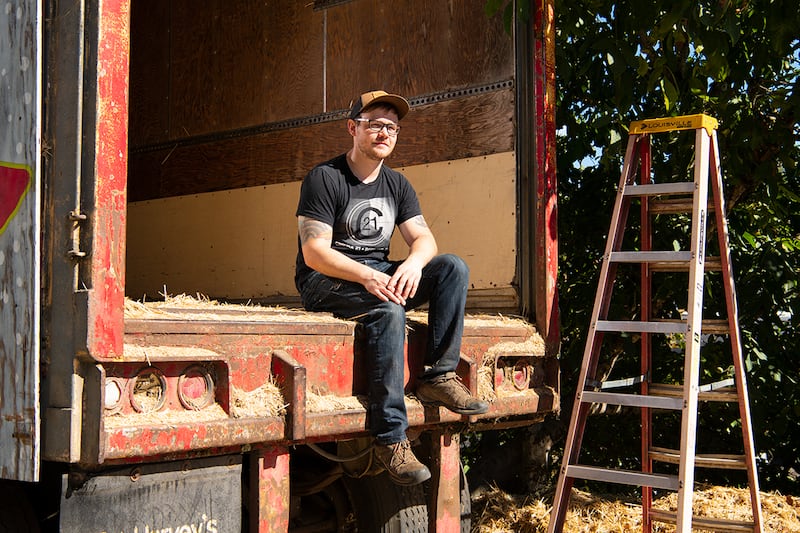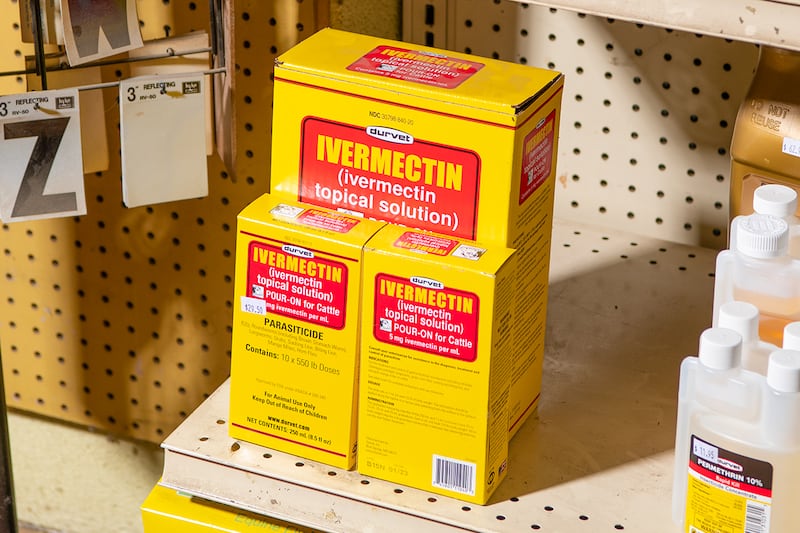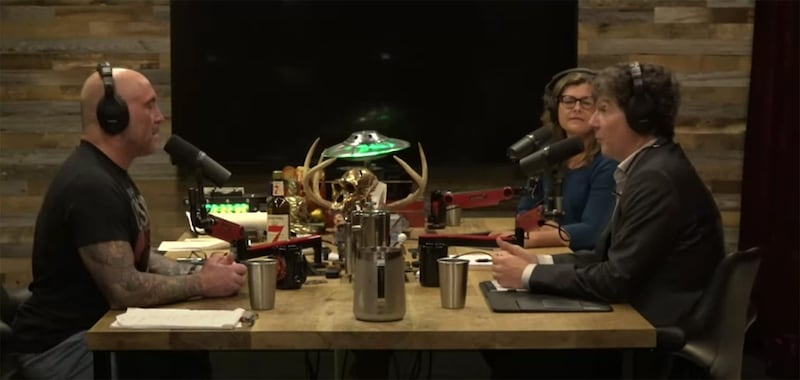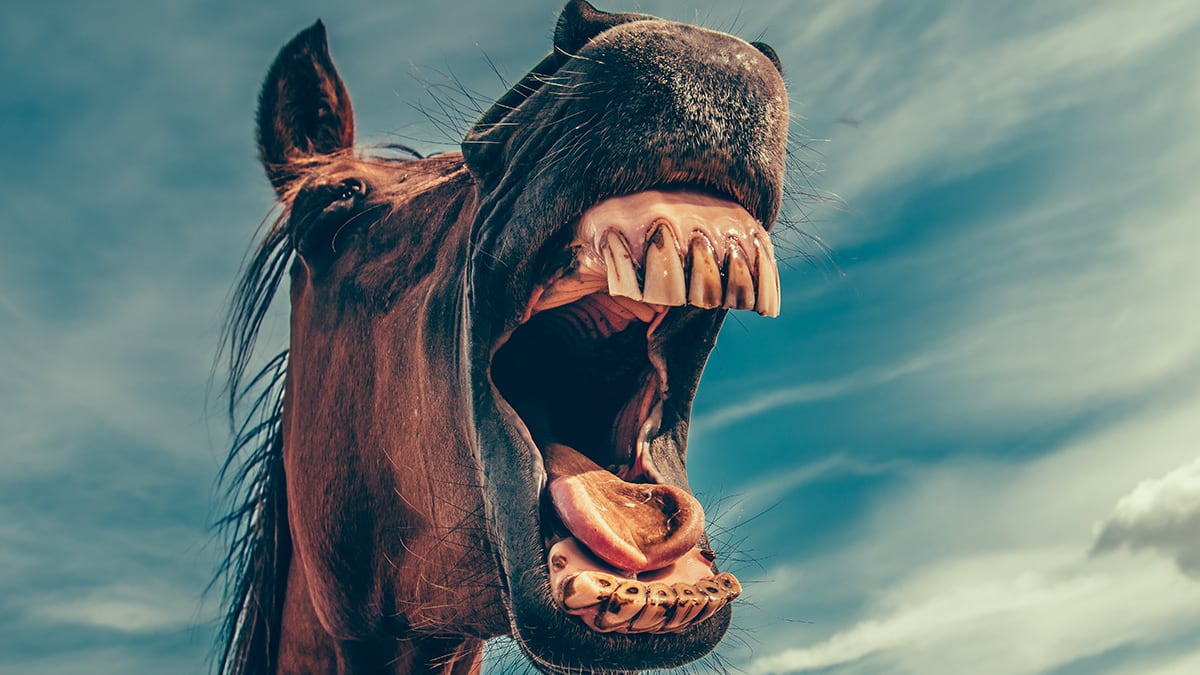The loudest COVID-19 vaccine skeptic in Oregon? You might think it’s pistol-packing, Trump-loving talk radio host Lars Larson. Or Baker City Mayor Kerry McQuisten, whose opposition to mask and vaccine mandates is stoking her run for governor.
You’d be wrong.
Instead, the loudest voice may be that of a Toyota-driving Bernie Bro who lives near Lewis & Clark College, an evolutionary biologist with a Ph.D. who studied and taught at two of the nation’s most liberal universities and participated in Occupy Wall Street.
His name is Bret Weinstein, and he makes his living preaching the dangers of COVID-19 vaccines while extolling ivermectin, the controversial drug often used to deworm horses.

Weinstein, 52, is one of the foremost proponents of ivermectin. He’s appeared on Tucker Carlson’s show to flog the drug. He and his wife, Heather Heying, also a Ph.D. biologist, went on Real Time With Bill Maher in January, an appearance that boosted interest in their DarkHorse Podcast, which has 382,000 subscribers on YouTube alone.
Weinstein’s biggest fan is probably Joe Rogan, host of the most popular podcast in the U.S. Weinstein appeared with Rogan four times, including a June 2020 show that’s gotten almost 8 million views on YouTube. In June 2021, it turned into a lovefest.
“Your podcast is one of my very favorites,” Rogan said. “I listen to it or watch it all the time. It’s an amazing source of rational thinking by educated people who talk about things they understand, which is exactly the opposite of what I do!”
Now, because of people like Weinstein, a drug meant for 1,000-pound animals is flying off the shelves in feed stores not just in red states, but even in Multnomah County, where the vaccination rate is approaching 80%.
Tyler Blach, a sales associate at Linnton Feed & Seed just west of the St. Johns Bridge, says the store has no more of the paste form—flavored with apple—that’s used for horses and has proven popular with vaccine-skeptical humans.
“Before this, I can’t recall a time when we were out,” Blach says.

Weinstein, 52, is no dummy. He has a Ph.D. in biology from the University of Michigan and, until recently, held a tenured professorship. Weinstein declined to be interviewed for this story, saying he would not be treated fairly. But Weinstein and Heying reveal much in their prolific writing and podcasting, where talk about minutiae goes hand in hand with postulating megatrends.
Weinstein, for example, would fit in well with much of Portland. He is gluten intolerant and a keen cyclist. He has a bike helmet that plays music. Heying loves paddle-boarding on the Willamette and watching wildlife. In an April piece for the online outlet called UnHerd, Weinstein said he and Heying considered cities around the world before choosing Portland for its “proximity to nature and its world-class food culture.”
But unlike most of their fellow residents in Multnomah County, both say they are not vaccinated. Instead, they protect themselves from COVID by eating whole foods from farmers markets and by taking weekly doses of ivermectin, along with vitamins C and D, and zinc.
Interviews with Weinstein’s former colleagues and a review of his work—starting with an explosive op-ed in his college newspaper—draw a picture of Weinstein as a tilter at windmills, someone who for much of his career has challenged authority and is now trafficking in what many medical experts and scientists say are false and dangerous theories about COVID.
“Bret Weinstein is one of the foremost purveyors of COVID-19 disinformation out there,” says Dr. David Gorski, a surgical oncologist and professor at Wayne State University who also debunks quack remedies as managing editor at a website called Science-Based Medicine. “Weinstein can be ‘credited’ with playing a large role in popularizing the belief that ivermectin is a miracle cure or preventative for COVID-19, that the vaccines are dangerous, and that the disease itself is not. Why are Rogan and Maher attracted to his messages? Contrarians and conspiracy theorists tend to be attracted to each other.”
Gorski says ivermectin is the new hydroxychloroquine, a malaria treatment pushed by former President Donald Trump and later proven worthless.
Nancy Koppelman, a former colleague of his at the Evergreen State College in Olympia, thinks Weinstein hasn’t done the work required to make broad claims about COVID and ivermectin but is instead just raising doubts based on dubious information—and monetizing the fear and ignorance of his audience.
Koppelman says he’s a modern-day P.T. Barnum. “What Barnum did was fool people into thinking that they were making sound judgments,” Koppelman says. “Bret is pandering to a principle of skepticism, but the substance is not there.”

Weinstein is correct that ivermectin is a miracle drug, just not for COVID.
In 1970, a microbiologist named Satoshi Omura took a soil sample near a golf course in Japan and coaxed a previously unknown species of bacteria from it. After a decade of research, Merck & Co. marketed ivermectin as a treatment for roundworm in animals.
It was approved for use in humans in 1988 and became the go-to treatment for onchocerciasis, or river blindness, a terrible disease caused by a parasitic worm commonly found in the rivers of Africa. Ivermectin became a blockbuster. Omura and a Merck scientist shared a Nobel Prize for their discovery in 2015.
The idea that ivermectin might be used to prevent or cure COVID-19 appears to have started with a 2020 study in Australia, where researchers exposed the coronavirus to ivermectin in a petri dish and stopped it from multiplying. Seeing that study and others, Weinstein, who had been following COVID closely on his podcast, went all in.
“I am unvaccinated, but I am on prophylactic ivermectin,” Weinstein said on his podcast in June. “And the data—shocking as this will be to some people—suggest that prophylactic ivermectin is something like 100% effective at preventing people from contracting COVID when taken properly.”
Weinstein likes ivermectin, he says, because it has a stellar safety record (it does) and it’s cheap (it is, at about $5 a pill). Vaccines, meantime, are the opposite. They aren’t proven to be safe yet, Weinstein says, and they’re more expensive (for the governments who purchase them).
Weinstein prides himself on being an iconoclast. He calls DarkHorse “a show for curious minds and freethinkers.” On COVID and ivermectin, he is definitely bucking the establishment.
The Centers for Disease Control and Prevention and the World Health Organization have endorsed use of the COVID-19 vaccines. The U.S. Food and Drug Administration gave full approval to the Pfizer-BioNTech vaccine on Aug. 23.
For ivermectin, it’s the opposite. The FDA has warned people not to take the drug because there is scant evidence it works against COVID-19. One promising Egyptian study was pulled amid charges of plagiarism and flawed data. Critics of the Australian study say the concentrations of ivermectin used in the petri dishes would be toxic in humans, and, indeed, people are poisoning themselves with the stuff.
In humans, ivermectin cream is used to treat head lice and the skin condition rosacea. Tablets are used for intestinal worms. The human formulation requires a prescription, but formulations for horses are widely available in farm stores and on Amazon, and people are taking them.
Poisonings are on the rise across the country, including in Oregon, as people ingest ivermectin in amounts intended for 1,000-pound animals. On Aug. 24, Oregon Health & Science University warned people not to use ivermectin to prevent or treat COVID. The Oregon Poison Center managed 21 ivermectin cases in August after handling just three in all of 2020, OHSU said.
Nationally, ivermectin exposure cases jumped 163% to 1,143 in the first eight months of this year, according to the American Association of Poison Control Centers.
People who take horse-sized doses of ivermectin can be in for a wild ride. One patient, for example, drank an injectable form of ivermectin for cows and ended up in the hospital for nine days, dazed and confused with hallucinations, rapid breathing, and body tremors, according to the CDC. More mundane symptoms include nausea, diarrhea, low blood pressure, and hives.
The FDA tweeted an unusually blunt warning on Aug. 21: “You are not a horse. You are not a cow. Seriously, y’all. Stop it.”
Weinstein appeared unmoved. His response on Twitter: “Just say neigh.”

Weinstein is 5-foot-9 and fit, with a thick head of graying hair. He often sports a cowboy hat on his podcast. On a visit to Rogan’s studio, he wore a black bandanna he “can pull up at a moment’s notice” to protect himself from COVID.
Koppelman, his former colleague at Evergreen, says Weinstein loves the Northwest. Years ago, they led a trip together to Dry Falls in eastern Washington, where Weinstein wowed students with his explanation of the Missoula Floods.
“He just did an amazing job,” she says.
Weinstein was born and raised in Los Angeles. He became interested in biology as a kid when his grandparents took him on a hike in Griffith Park and told him about Charles Darwin.
He enrolled at the University of Pennsylvania in 1987. During his freshman year, he went to a fraternity party at which, he says, fraternity leaders brought out two Black prostitutes to dance. Weinstein left, but he heard about what happened later and discussed it with the student newspaper, The Daily Pennsylvanian.
A few days later, Weinstein penned an op-ed about the event, damning the paper for missing key details. “Conspicuously absent was a description of how certain males present covered these women’s genitals with catsup,” Weinstein wrote. “Also missing was any mention of certain men present who penetrated these strippers’ vaginas with cucumbers.”
In a 2017 video, Weinstein says he got death threats for his candor.
He transferred to the University of California, Santa Cruz, where he met Heying. She earned a bachelor of arts degree in anthropology in 1992. Weinstein earned a biology degree with honors a year later. The couple began graduate work in biology at the University of Michigan, where Heying earned a Ph.D. in 2001.
Heying’s career brought the couple to Evergreen. She became a tenure-track professor there in 2002. The school hired Weinstein as an adjunct in 2003. In 2007, Koppelman teamed up with him to teach, a common practice at Evergreen.
“We’re both from a Jewish background, so arguing is affection,” Koppelman says. “He’s very, very smart and witty and fun. He is a dazzling presence.”
Koppelman says, however, Weinstein didn’t read the books she assigned for the course, a problem since he was supposed to teach all the books—his and hers—to students. She says he didn’t read The Scarlet Letter, for example, which she had assigned.
“He tried to fake it, that he had read them,” Koppelman says. “I had to cover for him. And I was morally conflicted about it.”

Weinstein became a tenured professor at Evergreen in 2015. Students adored him and Heying. Weinstein scored a rating of 4.7 out of 5 on ratemyprofessors.com, and Heying got a 4.9.
“Bret is easily the greatest professor that I have had,” one student wrote.
Some faculty disagreed. Zoltán Grossman, a professor of geography and Native American studies, recalls listening to Weinstein’s “self-centered monologues in faculty meetings” and reading his “constant manifestos” on faculty listservs.
The events that would change Weinstein’s life began in 2016, when Evergreen issued a new equity action plan. Weinstein emailed faculty and administrators that he didn’t think it would benefit Evergreen’s students of color, according to The Olympian newspaper.
He sent another email on March 15, 2017, protesting plans for Evergreen’s annual Day of Absence protest. In years past, people of color would stay away from Evergreen for a day to show what the campus would lack without them. In 2017, Evergreen flipped the script and proposed that white people leave. Weinstein said whites were coerced.
“It drove Bret insane,” Koppelman says. “He called it a day of racial segregation.”
His email on the subject went viral and all hell broke loose. On May 23, students mobbed his classroom and demanded he resign for being a racist. A day later, students barricaded the doors to the library. Two days after that, Weinstein went on Fox News, talking to Tucker Carlson for a piece called “Campus Craziness.”
A man called Evergreen and threatened to “execute as many people on that campus as I can get a hold of,” according to The Olympian. The campus closed for three days, and Evergreen moved commencement to Tacoma for greater security.
Weinstein and Heying filed a $3.85 million tort claim against Evergreen on July 5, saying the college had failed to “protect its employees.” They resigned that September, collecting settlements of $250,000 each.

Weinstein and Heying moved to Portland to reinvent themselves. Weinstein started their podcast on July 2, 2019. His first guest was Andy Ngo, the right-wing author and social media personality.
Since then, Weinstein and Heying have swamped the internet with content. They’ve produced dozens of podcasts, loosely based on evolution, and written acres of copy for various internet publications, including UnHerd, where, in May, Weinstein weighed in on the death of George Floyd, saying that his killer, Derek Chauvin, was “prejudged” in a “mob-influenced court” and may not have been guilty of murder because Floyd had heart disease and drugs in his system at the time of his death.
Weinstein and Heying say they’re focused on COVID to save lives. Data proving ivermectin’s safety and efficacy is so convincing, they claim, that it’s unethical for regulators to block its use. Weinstein’s says there is a vast conspiracy, led by drug companies, to discredit ivermectin as a COVID therapy so they can sell more profitable vaccines.
“I know that shareholder value must be driving things behind the scenes,” Weinstein told Rogan.
Railing against drugmaker profits appears to be a moneymaker for Weinstein and Heying. They live in a 3,500-square-foot home in Southwest Portland that they bought for $812,000 in 2018. They send at least one of their kids to Oregon Episcopal School, which costs $38,500 a year (and requires students to be vaccinated, by the way).
Cast out from academia, they pay for that lifestyle with the internet. Their DarkHorse Podcast appears on Apple Podcasts, Spotify and YouTube. They sell DarkHorse sweatshirts, T-shirts, coffee mugs, phone cases, and stickers at the DarkHorse online store. The premium pullover hoodie sells for $48.99.
They take turns reading ads before each podcast. Recently, they have been promoting a topical pain-relief product called CryoFreeze, a “power-packed CBD cryotherapy roll-on that delivers an arctic blast of topical cooling relief for sore muscles, back aches, and stiff joints” and costs $34.95 for 3 ounces, according to Omax Health, the company that makes it. Another sponsor: ExpressVPN, a company based in the British Virgin Islands that allows users to bypass geographic limits put in place by Netflix and other streaming services by cloaking a viewer’s location.
“I personally have watched BBC documentaries that are not accessible outside the U.K. by switching my location so that it appears that I am in the U.K.,” Weinstein said in an ad that ran during his Sept. 3 podcast. “And you can do this without even faking the accent!”
Weinstein and Heying each have accounts on Patreon, where they offer a menu of content options. For $2 a month, Weinstein will send an occasional newsletter. For $100 a month, subscribers get to join him in a Google Hangout on the first Saturday of every month called “Strategizing for the Coalition of the Reasonable.”
As of Sept. 13, Weinstein had 3,948 patrons. Even at the $2 subscription level, that adds up to almost $8,000 a month. Subscriptions for Heying’s 1,818 patrons start at $5 a month, bringing in at least $9,000. So, after platform and transaction fees, the couple probably earns a minimum of $170,000 a year on Patreon.
“It’s really easy to make money with credentials like M.D. and Ph.D. after your name if you’re just willing to sacrifice all of your principles and say things that people want to hear, for money,” says Dr. Keith Roach, associate professor of clinical medicine at Weill Cornell Medicine in New York.
But Patreon hasn’t been Weinstein and Heying’s largest source of income. Video commercials on their YouTube channels used to be, until YouTube “demonetized” their two YouTube channels, pulling paid video ads that ran before their shows because the pair disseminated information about COVID-19 that YouTube deemed inaccurate.
“The majority of my family’s income is in jeopardy because YouTube has decided that some things that are very strongly supported by evidence are misinformation,” Weinstein told Rogan.

Weinstein’s hard right turn into vaccine skepticism has alienated former allies. Neuroscientist and podcaster Sam Harris, who helped propel Weinstein to right-wing fame after the Evergreen crisis, devoted a whole show in July to vaccine disinformation, during which Harris and Eric Topol, a professor of molecular medicine at Scripps Research in La Jolla, Calif., puzzled over Weinstein’s schtick.
“I’ve heard enough to be very uncomfortable with what he’s put out there,” Harris said. “I do consider it dangerous.”
Topol went further. One of Weinstein’s claims, made on Twitter on June 25, is that headaches sometimes caused by COVID vaccines are evidence that the spike protein coded by the mRNA vaccines “not only crosses the blood-brain barrier, but tatters it, opening the central nervous system to toxins and pathogens.”
Topol rejected the claim, saying: “For anyone to posit that people who get a headache are having mRNA go into their brain is totally irresponsible. It’s reckless. It’s sick. It’s predatory. It’s really sad.”
Despite such critiques—or maybe because of them—Weinstein persists, churning out video and copy from his house in Southwest Portland.
Given his distaste for left-wing wokism at Evergreen, Portland seems an odd choice for Weinstein. In an April piece for UnHerd, he described Portland as a dystopia where riots “occur like clockwork” and “no neighborhood is secure from the current wave of terror.”
Plenty of people are saying similar things about Portland these days, but few sound as alarmist as Weinstein. But being alarmist might be what Bret Weinstein does best.
